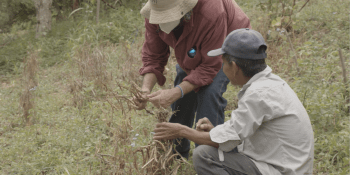Farming for the future: How young people will be feeding the next generation
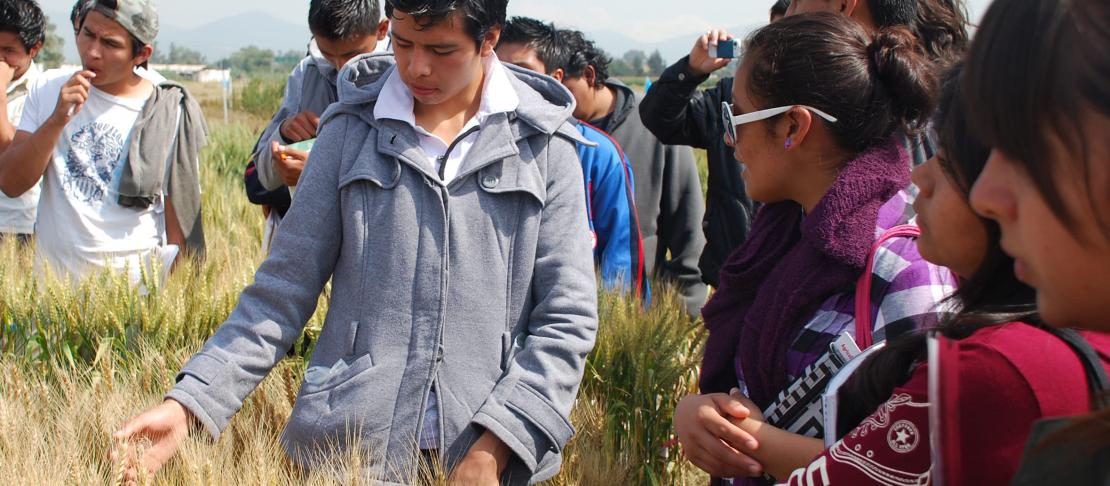
Young women and men in Nicaragua are increasing their knowledge and skills on environmentally-sustainable agricultural techniques through a youth-focused project. Lizz Harrison explains how she is working to boost young people's farming skills through the work of Y Care International.
Rainforests, sunshine and big spiders are things that often spring to mind when you think of Latin America. Well big spiders certainly do for me when I think of Nicaragua – or rather, spiders on my head as was the case on one visit!
This story is our second winner from the CCAFS open blog competition for the Latin America region.
Lizz Harrison is making a difference to food and farming around the world by working at Y Care International, an organisation that collaborates with youth organisations to help vulnerable young people enrich their lives. Agriculture development and food production are taking center stage in this work.
However, Nicaragua is less of a tropical paradise than you might think; it is one of the poorest countries in the region with nearly half the population living below the poverty line. Poverty here is overwhelmingly rural, with rural farmers among the poorest nationally, including those in Boaco Department, north-east of the capital Managua. Here, they are also living in an area affected by floods, droughts, and hurricanes.
More than 2.5 million people have been affected by these disasters in Nicaragua in the last 30 years, and the impacts of climate change are likely to make life harder still for these farmers in the future.
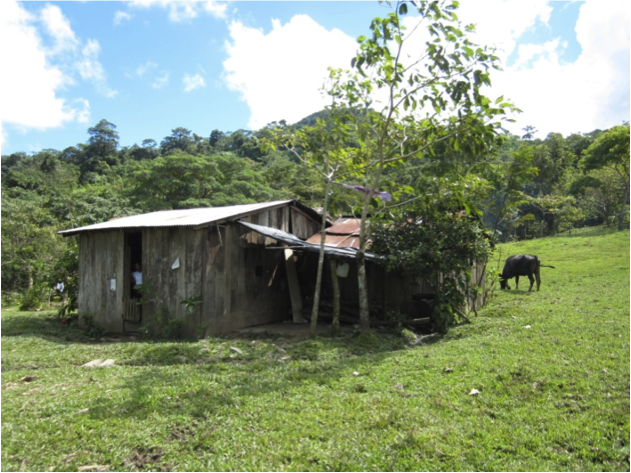
A typical home in nicaragua. photo: YCareinternational
Fighting food insecurity
The majority of households here depend on subsistence livelihoods and therefore rely on their land to produce enough food for themselves and their families. Combine this with poor soil fertility, scarcity of water, and natural hazards, and it’s clear that their reliable access to affordable and sufficient food is precarious. Add to the mix the uncertainty of how climate change might impact rainfall, temperature and natural hazards in the future and you see why food security here is a major concern.
But it’s not all doom and gloom as the youth-focused food security project, Feeding the Next Generation, is showing.
I’m lucky enough to work for Y Care International, who is running the project with our brilliant local partner, Nicaragua YMCA. The project is funded by the Big Lottery Fund for four years, and is already demonstrating how small changes can increase crop production while protecting the environment.
Farming to protect future generations
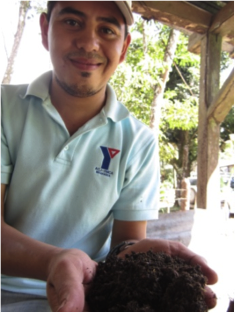 Young women and men are increasing their knowledge and skills on environmentally-sustainable agricultural techniques through training held locally. For example, young farmers learn about organic composting. Barney, one of the YMCA field staff, showed me a worm composting system at a local demonstration plot.
Young women and men are increasing their knowledge and skills on environmentally-sustainable agricultural techniques through training held locally. For example, young farmers learn about organic composting. Barney, one of the YMCA field staff, showed me a worm composting system at a local demonstration plot.
In the photo: Barney, Nicaragua YMCA field staff, holding a handful of worm compost.
Young farmers can practice the technique and use the nutrient-rich compost on their crops.
Water is of course another important factor in growing food.
Feeding the Next Generation has introduced water recycling systems in a number of households which route domestic waste water from dishwashing or showers through a simple, low-cost filtering system made of tyres, sand and charcoal. The water is used to irrigate crops close to the house.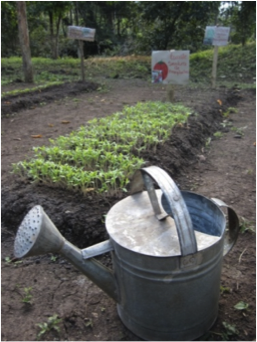
Young farmers are also learning about the benefits of crop diversification. Growing a variety of crops means there are others to eat if one fails. It also allows farmers to trial which crops grow best and stagger harvesting times; particularly important given changes in rainfall, temperature and the onset of the rainy season noticed by farmers in the region.
These changes are being monitored by small meteorological stations installed as part of this project.
In the photo: A ‘kitchen garden’ irrigated by recycled water.
Empowering young women
The situation for young rural women in Nicaragua is particularly challenging as social norms and gender stereotypes mean that they have less time than men to engage in productive activities as they are responsible for childcare and other household duties.
However, through the project, young women are learning to grow fruit and vegetables in ‘kitchen gardens’. This food supplements their families’ diet and increases their food sec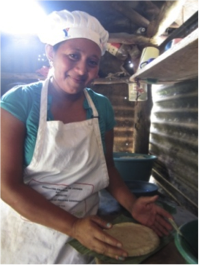 urity as Yunely, a 25 year old mother of two told me:
urity as Yunely, a 25 year old mother of two told me:
“I am growing carrots, peppers, cucumbers, onions and melons now in my garden. I wasn’t growing anything before the training but I learnt how to and me and my family eat the fruit and vegetables that I grow now. They’re really good!”
It also increases young women’s ability to increase their family’s income by turning the vegetables and fruit they grow into produce like vegetable preserves and fruit sweets to sell at market.
Training on agro-processing gives young women the opportunity to establish a small business and has resulted in increased self-confidence and plays a part in breaking down barriers that limit the role of women in society.
Reducing the risks of disaster and climate change
Feeding the Next Generation also considers the impact that disasters have on food security. I met Maria, 18, who is the coordinator of her community disaster management committee, established through this project. The members have received training on disaster risk reduction and are sharing their knowledge on disaster risks and how to prepare for them with their communities.
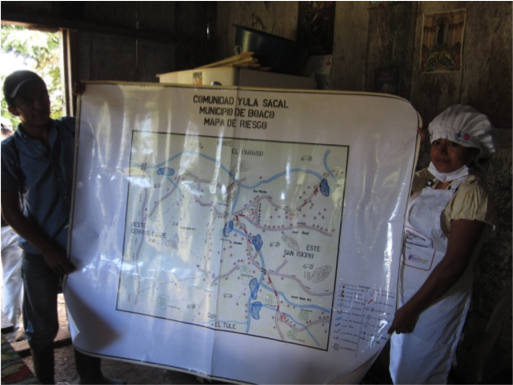
Maria, 18, and another young community disaster management committee member hold up the risk map of their community, Yula Sacal. Photo: YCareInternational
Maria showed me the map young people in her committee had led on producing which shows the hazards, vulnerabilities and capacities in the area. Having an understanding of hazards such as flooding, droughts and hurricanes, which will be affected by climate change, as well as supporting young farmers to increase their food production, will increase these communities’ food security and resilience to changes in the future.
Read all the winning stories from CCAFS open blog competition
Follow Lizz Harrison and Y Care International on Twitter: @LizzHarrison2 & @YCareInt for updates.
This story does not necessarily reflect the views of the CGIAR Research Program on Climate Change, Agriculture and Food Security (CCAFS).



